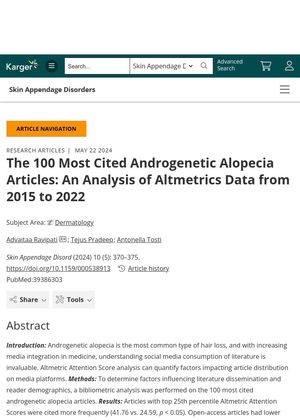TLDR Healthcare professionals are selective in reading, while the public struggles to find reliable dermatology sources.
The analysis of the 100 most cited androgenetic alopecia articles from 2015 to 2022 reveals that articles with higher Altmetric Attention Scores are cited more frequently. Open-access articles are less likely to be read by healthcare professionals, while funded studies and those published in high-impact journals have higher readership odds. Interest from scientists and healthcare professionals is notably high for publications on 5α-reductase inhibitors. The study concludes that healthcare professionals are more selective in their reading compared to the general public, who may struggle to find reliable dermatology sources. Altmetrics effectively quantify readership trends and public interest in dermatology research.
 26 citations
,
October 2021 in “Current Dermatology Reports”
26 citations
,
October 2021 in “Current Dermatology Reports” Social media is increasingly used in dermatology for education and networking but has risks like misinformation and privacy issues.
 145 citations
,
November 2017 in “Journal of The European Academy of Dermatology and Venereology”
145 citations
,
November 2017 in “Journal of The European Academy of Dermatology and Venereology” Use minoxidil for hair loss treatment; assess results after 6 months.
 153 citations
,
March 2017 in “Endocrine”
153 citations
,
March 2017 in “Endocrine” Male pattern baldness involves genetics, hormones, and needs better treatments.
January 2026 in “Biomacromolecules” A new method using nanolipogels with fucosterol can help regrow hair by targeting follicles, reducing inflammation, and improving blood flow.

Recent research on androgenetic alopecia focuses on optimizing treatments, with promising new therapies emerging.
 8 citations
,
December 2022 in “Nature Reviews Endocrinology”
8 citations
,
December 2022 in “Nature Reviews Endocrinology” Sex hormones' effects on COVID-19 are unclear and more research is needed to understand their potential as treatment.
 2 citations
,
January 2023 in “Sexual Medicine”
2 citations
,
January 2023 in “Sexual Medicine” The Men's Training Cup Keep Training masturbation aid may help delay ejaculation and improve erectile function.
 489 citations
,
November 2021 in “Signal Transduction and Targeted Therapy”
489 citations
,
November 2021 in “Signal Transduction and Targeted Therapy” The JAK/STAT pathway is important in cell processes and disease, and JAK inhibitors are promising for treating related conditions.








